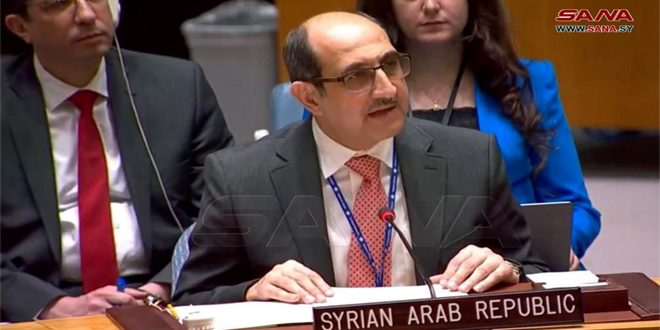New York, (ST) – Syria’s permanent representative to the United Nations Bassam Sabbagh stressed that some countries should abandon their hostile and wrong approach towards Syria, and should not to exploit the Security Council’s discussions regarding the so-called “chemical file” for political purposes.
He also stressed that the Technical Secretariat of the Organization for the Prohibition of Chemical Weapons (OPCW) should work with impartiality and respect the scientific explanations provided by the Syrian National Committee on some of the issues under discussion.
During a session of the Security Council today on the “chemical file” in Syria, Sabbagh said that the world’s celebration yesterday on the International Day for Awareness of Disarmament and Non-Proliferation is an occasion to recall the importance of the efforts made to get rid of weapons of mass destruction, whose use considered as crimes against humanity, as they caused tragedies throughout history to humanity. The worst of which was the US dropping of two atomic bombs on the cities of Hiroshima and Nagasaki in Japan in 1945, which caused the death of hundreds of thousands.
Sabbagh added that this International Day also reminds of the first incident of the use of chemical weapons in history in the Belgian town of Ypres during the First World War, which resulted in the deaths of tens of thousands.
Sabbagh pointed out that on March 19, 2013, Syria witnessed the first use of chemical weapons, when terrorist groups fired a shell carrying toxic chemicals at the Khan Al-Asal area in Aleppo governorate, killing 25 people, most of them from the Syrian Arab Army forces, injuring 110 others and causing cases of suffocation. He indicated that some countries still ignore this incident until now.
Sabbagh indicated that the terrorist organizations, in coordination with the terrorist “White Helmets” continue to prepare flase flag operations using chemical weapons to accuse the Syrian government.
Sabbagh pointed out that Syria, out of its belief in disarmament and non-proliferation, took a strategic and voluntary decision in 2013 to join the Chemical Weapons Convention, and it was one of the first countries to join to the Nuclear Non-Proliferation Treaty. He added that Syria also signed the Biological Weapons Convention and actively contributed to efforts to establish a zone free of weapons of mass destruction in the Middle East.
Sabbagh said that Syria continued its constructive cooperation with the OPCW as the National Committee submitted its 111th report regarding the activities that were carried out. He added that the committee also received the small team of the declaration evaluation team that visited Syria last January, during which consultations took place between the two sides and many aspects related to some outstanding issues were discussed.
Sabbagh confirmed the readiness of the Syrian National Committee to communicate with its counterpart in the OPCW to prepare a high-level meeting between the Minister of Foreign Affairs and Expatriates, the Chairman of the Syrian National Committee, and the Director General of the organization, and it is looking forward to holding this meeting as soon as possible.
Sabbagh indicated that the committee also recently provided the technical secretariat of the organization with pictures of the site where the two chlorine cylinders associated with the alleged Duma incident were destroyed as a result of an Israeli aggression on this site, which was confirmed by sources in the Israeli occupation entity, including the Minister of Intelligence.
The permanent representative of Syria to the United Nations stressed that ignoring the constructive and fruitful cooperation of the National Committee during the past years and all the facilities it provided to the various teams of the organization and making false accusations regarding Syria’s failure to implement its obligations are clear indications of the extent of politicization that has overwhelmed the work of the organization and proves its distance from the purpose for which it was found.
Sabbagh pointed out that the unprofessional reports issued by the Technical Secretariat, which were based on information that have no credibility, and did not follow the methodology stipulated in the agreement, allowed Western countries to use these reports as a platform to target Syria.
Sabbagh said that there is a need for the technical secretariat of the Organization for the Prohibition to deal in good faith and impartiality.
“It is time to re-technicalize the work of the Organization for the Prohibition of Chemical Weapons”, Sabbagh concluded.
Raghda Sawas

